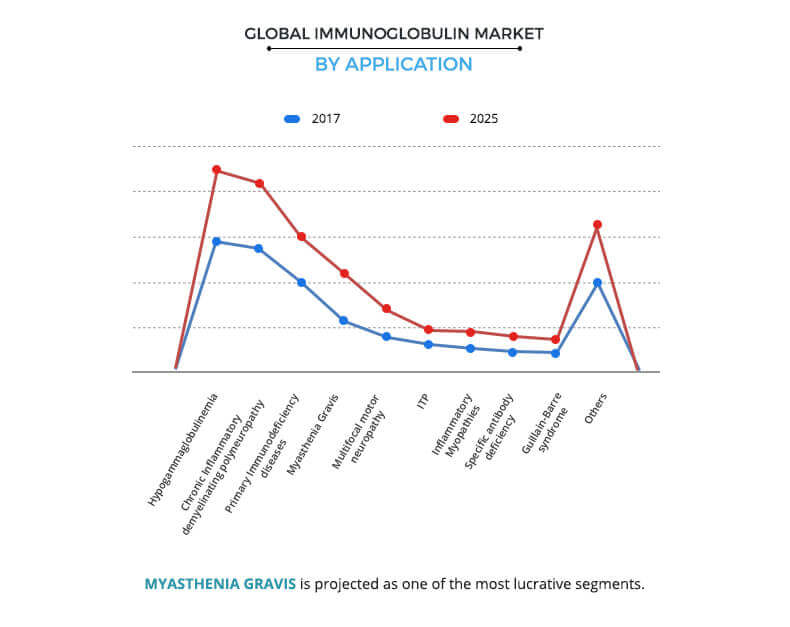Immunoglobulin (Ig) refers to a group of proteins that are part of the body’s immune system. They are also known as antibodies and play a crucial role in defending the body against infections and other foreign substances. There are different types of immunoglobulins, including IgG, IgM, IgA, IgD, and IgE. Each type has a different function in the immune response and plays a role in either recognizing and neutralizing foreign substances, or activating other cells in the immune system.
Immunoglobulin can also be obtained from outside the body, such as through blood transfusions or intravenous immunoglobulin (IVIG) therapy. This therapy involves the administration of purified immunoglobulin from human plasma to help boost the patient’s immune system and treat various conditions, such as primary immunodeficiency, autoimmune disorders, and infections. The global immunoglobulin market was valued at $9,972.9 million in 2017 and is expected to reach $16,694.7 million by 2025, CAGR of 6.6% from 2018 to 2025.
1. How is immunoglobulin manufactured?
Plasma is the yellowish liquid portion of blood that contains various proteins, including immunoglobulins. Here is a general overview of the manufacturing process:
- Collection of plasma: Plasma is collected from blood donors through a process called plasmapheresis. During this procedure, blood is removed from the donor, and the plasma is separated from the red blood cells.
- Pooling of plasma: The collected plasma is pooled from multiple donors to reduce the risk of contamination and increase the yield of immunoglobulin.
- Fractionation of plasma: The pooled plasma is then processed to separate the different proteins, including immunoglobulins. This is typically done through a combination of physical and chemical methods, such as centrifugation and precipitation.
- Purification of immunoglobulin: The immunoglobulin is further purified through a series of chromatography steps to remove any impurities and ensure the safety and quality of the final product.
- Formulation and packaging: The purified immunoglobulin is then formulated into the desired dosage form, such as a liquid or powder, and packaged for administration.
- How do immunoglobulins work?
Immunoglobulins, also known as antibodies, play a crucial role in the body’s immune response by recognizing and neutralizing foreign substances, such as viruses, bacteria, and toxins. Here is a general overview of how immunoglobulins work:
- Recognition: Immunoglobulins recognize specific foreign substances, known as antigens, and bind to them. This is made possible by the unique shape of the immunoglobulin molecule, which allows it to fit snugly around the antigen like a key in a lock.
- Neutralization: Once the immunoglobulin has bound to the antigen, it can neutralize the foreign substance in several ways. For example, it can block the antigen’s ability to infect cells, or it can trigger the removal of the antigen by other cells in the immune system.
- Activation: In some cases, immunoglobulins can also activate other cells in the immune system to respond to the foreign substance. For example, they can activate immune cells called phagocytes to engulf and destroy the antigen.
Download Free Sample PDF: https://www.alliedmarketresearch.com/request-sample/2586
3. What are the benefits of immunoglobulin?
- Immunoglobulin (Ig) therapy can provide several benefits for individuals with various medical conditions, including:
- Boosting the immune system: Ig therapy can help boost the immune system by providing additional antibodies to help fight infections and other diseases.
- Treating primary immunodeficiency: For individuals with primary immunodeficiency disorders, such as common variable immunodeficiency, Ig therapy can help replace the missing or deficient immunoglobulins and improve immune function.
- Treating autoimmune disorders: For individuals with autoimmune disorders, such as Guillain-Barre syndrome and Kawasaki disease, Ig therapy can help suppress the immune system and reduce inflammation.
- Treating infections: Ig therapy can also be used to treat certain infections, such as hepatitis B, varicella-zoster virus, and rabies.
- Preventing infections: In some cases, Ig therapy can also be used to prevent infections in individuals who are at increased risk, such as those with a weakened immune system.
- What immunoglobulin is used for?
- Primary immunodeficiency disorders: For individuals with primary immunodeficiency disorders, such as common variable immunodeficiency and X-linked agammaglobulinemia, Ig therapy can help replace the missing or deficient immunoglobulins and improve immune function.
- Autoimmune disorders: For individuals with autoimmune disorders, such as Guillain-Barre syndrome and idiopathic thrombocytopenic purpura, Ig therapy can help suppress the immune system and reduce inflammation.
- Infections: Ig therapy can also be used to treat certain infections, such as hepatitis B, varicella-zoster virus, and rabies.
- Immune-mediated diseases: In some cases, Ig therapy can also be used to treat immune-mediated diseases, such as autoimmune hemolytic anemia and immune thrombocytopenic purpura.
- Transplantation: Ig therapy can also be used to help prevent transplant rejection in individuals who have received an organ transplant.
𝗖𝗼𝗻𝘁𝗮𝗰𝘁:
David Correa
5933 NE Win Sivers Drive
#205, Portland, OR 97220
United States
USA/Canada (Toll Free): +1-800-792-5285, +1-503-894-6022
UK: +44-845-528-1300
Hong Kong: +852-301-84916
India (Pune): +91-20-66346060
Fax: +1(855)550-5975
help@alliedmarketresearch.com


